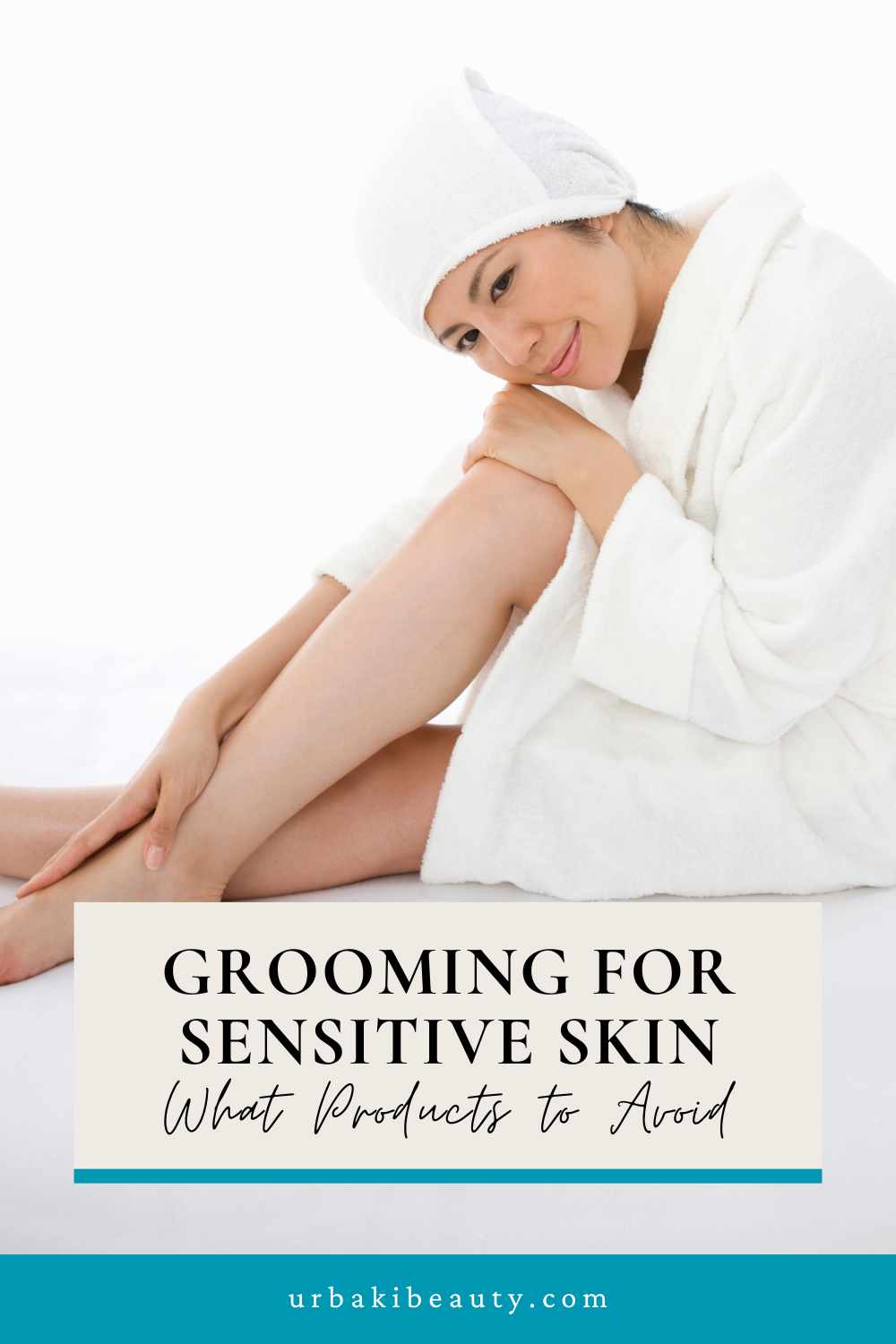Grooming for Sensitive Skin: What Products to Avoid

Sensitive skin can be a real challenge to care for, especially when it comes to choosing the right grooming products. If you have sensitive skin, you might often experience redness, itching, burning, or dryness when using certain skincare and grooming items.
These reactions can be triggered by a wide range of ingredients, from fragrances to harsh chemicals and even certain preservatives. Finding products that are both effective and gentle on the skin is essential.
This article will provide insights into what types of products should be avoided when you have sensitive skin and offer some helpful alternatives for maintaining a healthy, glowing complexion.
Understanding Sensitive Skin
What is Sensitive Skin?
Sensitive skin is a condition in which the skin reacts to products or environmental factors more intensely than usual.
It may be prone to irritation, redness, burning sensations, and inflammation when exposed to certain substances.
The skin's barrier function may be weakened, which makes it more susceptible to external factors like temperature changes, skincare products, or allergens.
For individuals with sensitive skin, gentleness is the key. Products that are too harsh or contain ingredients that disrupt the skin’s natural barrier can cause irritation or exacerbate underlying conditions like eczema or rosacea.
Causes of Sensitive Skin Reactions
External Factors: Environmental factors like pollution, sun exposure, and extreme weather conditions can irritate sensitive skin.
Harsh Ingredients: Some grooming products contain fragrances, alcohol, or preservatives that can trigger allergic reactions or cause dryness.
Over-exfoliation: Exfoliating too often or using overly harsh exfoliants can strip the skin of its natural oils, causing irritation.
Skin Conditions: Certain skin conditions, such as eczema, rosacea, and psoriasis, can make the skin more prone to irritation.
Common Grooming Products to Avoid for Sensitive Skin
1. Fragrances
Fragrances are one of the most common triggers for sensitive skin reactions. They are often added to grooming products like shampoos, lotions, deodorants, and soaps to enhance their scent. However, these artificial fragrances can irritate the skin and lead to allergic reactions.
Why Avoid Fragrances?
Fragrances, especially synthetic ones, are made up of a complex mixture of chemicals that can cause skin irritation or even long-term skin sensitivity. Even natural fragrances, such as essential oils, can trigger reactions in sensitive individuals, though they tend to be less irritating.
Symptoms: Redness, rashes, hives, itching, and dry patches are common symptoms of fragrance sensitivity.
Alternatives: Look for products labeled as fragrance-free or unscented. These products are designed to be gentler on the skin and do not contain added fragrances that could irritate.
2. Alcohol-Based Products
Alcohol is commonly found in many grooming products, including toners, shaving creams, and hair sprays. While alcohol may provide a refreshing, cooling sensation, it can also be drying and irritating to sensitive skin.
Why Avoid Alcohol?
Alcohol-based products can strip the skin of its natural moisture, leading to dehydration, tightness, and flakiness. This can damage the skin’s protective barrier, making it more vulnerable to irritants and causing further discomfort.
Symptoms: Stinging, redness, and excessive dryness are common reactions to alcohol in skincare products.
Alternatives: Choose products that are alcohol-free and contain hydrating ingredients such as glycerin, hyaluronic acid, or ceramides. These ingredients will help keep the skin moisturized and protected.
3. Harsh Exfoliants
Exfoliation can be a great way to remove dead skin cells and reveal a smoother complexion, but it’s essential to use the right type of exfoliant, especially for sensitive skin.
Harsh physical exfoliants like scrubs with large, rough particles or strong chemical exfoliants can cause microtears in the skin, leading to irritation and inflammation.
Why Avoid Harsh Exfoliants?
Exfoliating too often or using abrasive products can disrupt the skin’s natural protective barrier. Sensitive skin, which is already more prone to irritation, can become inflamed and overly sensitive after using aggressive exfoliants.
Symptoms: Redness, burning sensations, and increased sensitivity to touch or products can occur after over-exfoliating.
Alternatives: Opt for gentle exfoliants that contain mild acids like lactic acid or fruit enzymes, which exfoliate without irritating the skin. Chemical exfoliants are often more suitable for sensitive skin than physical scrubs.
4. Harsh Shaving Creams
Shaving can be especially challenging for individuals with sensitive skin, as shaving creams and gels often contain ingredients that can dry out or irritate the skin.
Many shaving creams contain synthetic fragrances, alcohol, and other irritating chemicals that can cause a stinging sensation or lead to razor burn.
Why Avoid Harsh Shaving Creams?
Shaving removes hair, but it also strips away some of the skin’s natural oils. When combined with harsh chemicals or fragrances, this can lead to irritation, razor bumps, and even ingrown hairs.
Symptoms: Redness, bumps, and rashes are common after shaving with harsh products.
Alternatives: Look for sensitive-skin shaving creams or gel formulas that are fragrance-free and contain soothing ingredients like aloe vera, chamomile, or vitamin E. These ingredients will help calm the skin and reduce irritation.
5. Sulfates
Sulfates are detergents commonly found in shampoos, cleansers, and body washes. They are responsible for creating the foaming effect in many personal care products.
However, sulfates can be too harsh for sensitive skin and often strip it of natural oils, leading to dryness and irritation.
Why Avoid Sulfates?
Sulfates, such as sodium lauryl sulfate (SLS) and sodium laureth sulfate (SLES), are known to cause skin dryness and may contribute to the development of eczema or other skin conditions. They can also exacerbate conditions like rosacea and acne.
Symptoms: Excessive dryness, tightness, and flaking are common side effects of sulfates.
Alternatives: Opt for sulfate-free shampoos and gentle cleansers that use natural surfactants, such as cocamidopropyl betaine or decyl glucoside, to clean the skin without stripping it of its natural moisture.
6. Parabens and Phthalates
Parabens and phthalates are chemicals often used as preservatives or to enhance the fragrance of products. They are commonly found in lotions, deodorants, and cosmetics, and while they help products last longer, they can irritate sensitive skin.
Why Avoid Parabens and Phthalates?
Some studies have raised concerns about the potential hormonal effects of parabens and phthalates, and these chemicals can cause skin irritation, particularly for those with sensitive skin. Prolonged exposure may lead to allergic reactions and increased skin sensitivity.
Symptoms: Redness, itching, and swelling are common after exposure to parabens and phthalates.
Alternatives: Look for paraben-free and phthalate-free products. Brands that focus on natural and organic ingredients are often a safer choice for sensitive skin.
7. Synthetic Dyes and Colorants
Many personal care products contain synthetic dyes and colorants to make them visually appealing. However, these dyes can trigger allergic reactions, especially in people with sensitive skin.
Why Avoid Synthetic Dyes?
Synthetic dyes, such as those used in shampoos, soaps, and lotions, can cause skin irritation, hives, or rashes in sensitive individuals. These artificial colorants often contain toxic chemicals that can disrupt the skin’s natural balance.
Symptoms: Skin irritation, rashes, and increased sensitivity can occur when exposed to synthetic dyes.
Alternatives: Choose products with natural colorants or those labeled as free from artificial dyes. Uncolored and pure products are often gentler on the skin.
Conclusion
For individuals with sensitive skin, it’s essential to choose grooming products that nourish, protect, and soothe rather than aggravate the skin.
Avoiding harsh ingredients like fragrances, alcohol, sulfates, and synthetic dyes can help reduce irritation and prevent long-term skin issues.
By opting for gentler, natural, and fragrance-free alternatives, you can maintain healthy, comfortable skin without compromising your grooming routine.
Always remember to patch-test any new product to ensure it’s compatible with your skin, and don’t hesitate to consult a dermatologist if you experience persistent irritation.
Did you find this post useful or inspiring? Save THIS PIN to your Beauty Board on Pinterest! 😊






You may also like